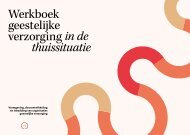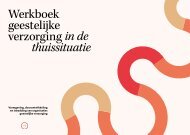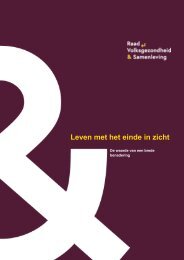Buiten kerk en moskee
Religie in een pluriforme samenleving. Diversiteit en verandering in beeld.
Religie in een pluriforme samenleving. Diversiteit en verandering in beeld.
Create successful ePaper yourself
Turn your PDF publications into a flip-book with our unique Google optimized e-Paper software.
Christian elem<strong>en</strong>ts or adjusting the old meaning to create new cont<strong>en</strong>t that is more relevant<br />
for them. The optimistic elem<strong>en</strong>ts of religion would seem to be those that stand the<br />
test of time best. For example, the belief that miracles happ<strong>en</strong>, that praying helps, that<br />
there is life after death and ev<strong>en</strong> that heav<strong>en</strong> exists, that good or the pot<strong>en</strong>tial for good is<br />
lat<strong>en</strong>t in everyone and is waiting to be awok<strong>en</strong> by God’s love. Less popular, by contrast, are<br />
the devil and sin, a vision of man as a fragile reed, a restless plodder who continually<br />
comes up against personal limits, groping around in the dark, at God’s mercy.<br />
8.2.4 The number of atheists and agnostics continues to grow<br />
The perc<strong>en</strong>tage who never att<strong>en</strong>d a church service rose from 53% in 1983 to 69% in 2018,<br />
while the perc<strong>en</strong>tage of avowed atheists increased from 16% in 1991 to 29% in 2018. In<br />
2018, 22% of Dutch citiz<strong>en</strong>s described themselves as barely religious and 37% as definitely<br />
not religious. The figures from Chapter 3 do not suggest that this situation will change any<br />
time soon. In this research, the perc<strong>en</strong>tage of non-church goers was 73%, the perc<strong>en</strong>tage<br />
of atheists 32% (more than half of the Dutch population now see themselves as atheists or<br />
agnostics) and the perc<strong>en</strong>tage of people that definitely do not see themselves as religious<br />
45%. The initial fading away and later disappearance of the Supreme Being is easy to follow<br />
via population surveys. The perc<strong>en</strong>tage who believe in a God who is concerned about<br />
each and every one of us personally has shrunk by two-thirds since the mid-1960s. Initially,<br />
in the 1960s and 1970s, the perc<strong>en</strong>tage of ‘ietsists’ (‘somethingists’) rose rapidly, followed<br />
in the 1980s and 1990s by the perc<strong>en</strong>tage of agnostics, while since the turn of the mill<strong>en</strong>nium<br />
it is the perc<strong>en</strong>tage of atheists that has be<strong>en</strong> rising strongly.<br />
Culture is developing in an areligious direction too, which is another indicator of secularisation.<br />
Church ceremonies are becoming a less and less promin<strong>en</strong>t part of national public life,<br />
and trust in the Church is also crumbling. 7 It must be borne in mind here that the chance is<br />
vanishingly small that someone who picks up almost nothing about the Christian tradition<br />
from their upbringing, little from other socialisation settings and only indirect and small<br />
impulses from the surrounding culture will ever develop into a committed church member,<br />
for example. Compared with church milieus, the success of non-church milieus in terms of<br />
socialisation is <strong>en</strong>ormous. 8 Thus, giv<strong>en</strong> network effects like this, there is little reason to<br />
suppose that the growth in the perc<strong>en</strong>tage of non-believers is a developm<strong>en</strong>t that will correct<br />
itself in the near future. ‘God in the Netherlands’, a series of surveys that have be<strong>en</strong><br />
held since 1966, traces the collapse in the belief in the Christian doctrine. If we limit ourselves<br />
to the four fundam<strong>en</strong>tal pillars of the Christian faith, each of them – the belief in a<br />
God who is personally concerned about each and every human being, the status of Christ<br />
as his son or s<strong>en</strong>t into the world by him, the view that the Bible is the word of God and the<br />
belief in life after death – are now supported by only a minority of the population (ranging<br />
from 14% to 28%).<br />
In the light of all of the above, it is difficult to argue with the premise that the Christian<br />
religion, both in terms of belief and in the form of collective participation and churchbased<br />
organisation, is gradually disappearing in the Netherlands (and elsewhere; see Chap-<br />
156 c o n c l u d i n g r e m a r k s o n t h r e e r e p o r t s










